
ZuriHac is the biggest Haskell community event in the world: a completely free, three-day grassroots coding festival co-organized by the Zürich Friends of Haskell and the OST Eastern Switzerland University of Applied Science. It is not your standard conference with papers and presentations, but features fantastic keynotes, hands-on tracks, hacking on many of your favourite projects, and of course lots of socializing!
ZuriHac takes place Saturday 10 June — Monday 12 June 2023 as a physical event at the beautiful Rapperswil-Jona campus of OST located right next to lake Zürich. We hope to see you there!
Simon is one of the designers of the Haskell language, an inspiring leader for the whole Haskell community, a prolific researcher, and one of the main authors of GHC, the de facto standard Haskell compiler.
Gabriella is a Haskell programmer at Mercury and a deck-building game superstar. She is the author of a ton of Haskell libraries and tools including pipes and Dhall, and she also writes the amazing Haskell for all blog.
Bartosz is a physicist and C++ programmer who worked at Microsoft before starting his own company, Reliable Software. In the Haskell Community, his book Category Theory for Programmers is widely respected and frequently recommended.
Ben Lynn is a serious programmer who has written a large number of great Haskell articles. In the wider programming community, his Git Magic guide is very popular as well.
Conal Elliott is a researcher who has written some of the coolest papers around Haskell such as Functional Reactive Animation and Compiling to categories, in addition to his work around differentiation and denotational design.
Alexis is the author of Hackett, a language that attempts to combine the best aspects of Haskell and Racket. In the Haskell world, she is well known for her work around delimited continuations that she is now working on at Tweag.
ZuriHac is primarily a community event and a hackathon, rather than a conference. Aside from the talks and tracks, attendees are encouraged to work together on all sorts of Haskell-related open-source projects and socialize. Trying to attend everything may a bit too much, just pick what you find interesting!
Here is a list of projects participants are planning to work on—feel free to add your own!
This schedule is tentative and minor changes may still need to happen as we get closer to the event.
| Start | End | Title | Link | Kind |
|---|---|---|---|---|
| 2023-06-10T09:00:00+02:00 | 2023-06-10T10:00:00+02:00 | Registration Opens | admin | |
| 2023-06-10T10:00:00+02:00 | 2023-06-10T11:00:00+02:00 | Talk by Simon Peyton Jones | #speaker-simon-peyton-jones | talk |
| 2023-06-10T11:00:00+02:00 | 2023-06-10T12:00:00+02:00 | Opening Presentation & Project Pitches | admin | |
| 2023-06-10T13:00:00+02:00 | 2023-06-10T15:00:00+02:00 | Beginner Track | beginner | |
| 2023-06-10T13:00:00+02:00 | 2023-06-10T15:00:00+02:00 | Category Theory Track | advanced | |
| 2023-06-10T15:30:00+02:00 | 2023-06-10T16:30:00+02:00 | Lightning Talks | #lightning-talks | talk |
| 2023-06-10T17:00:00+02:00 | 2023-06-10T18:00:00+02:00 | Talk by Conal Elliott | #speaker-conal-elliott | talk |
| 2023-06-11T10:00:00+02:00 | 2023-06-11T11:00:00+02:00 | Talk by Alexis King | #speaker-alexis-king | talk |
| 2023-06-11T12:00:00+02:00 | 2023-06-11T15:00:00+02:00 | Beginner Track | beginner | |
| 2023-06-11T12:00:00+02:00 | 2023-06-11T15:00:00+02:00 | Lazy Evaluation by Andres Löh | #advanced | advanced |
| 2023-06-11T15:30:00+02:00 | 2023-06-11T16:30:00+02:00 | Lightning Talks | #lightning-talks | talk |
| 2023-06-11T17:00:00+02:00 | 2023-06-11T18:00:00+02:00 | Talk by Gabriella Gonzalez | #speaker-gabriella-gonzalez | talk |
| 2023-06-12T10:00:00+02:00 | 2023-06-12T11:00:00+02:00 | Talk by Ben Lynn | #speaker-ben-lynn | talk |
| 2023-06-12T13:00:00+02:00 | 2023-06-12T15:00:00+02:00 | Category Theory Track | advanced | |
| 2023-06-12T15:30:00+02:00 | 2023-06-12T17:00:00+02:00 | Project presentations | admin |
The Haskell Foundation, the OST Eastern Switzerland University of Applied Sciences, and the GHC development team are organizing a three-day workshop to be held immediately prior to Zurihac at the same venue. Applications for the event have closed. For more information, please consult the event's web page.
Lazy Evaluation by Andres Löh
In this workshop, we are going to take a deep dive into lazy evaluation, looking at several examples and reasoning about how they get evaluated. The goal is to develop a strong understanding of how Haskell’s evaluation strategy works. Hopefully, we will see why laziness is a compelling idea with a lot of strong points, while also learning how some common sources of space leaks can be avoided.
The workshop will be accessible to anyone who has mastered the basics of Haskell and is looking to understand the language in more depth, whether they are a student or professional developer. We are not going to use any advanced features of the language, and you do not have to be a Haskell expert to attend!
Over the past ten years, we've exclusively held invited talks at ZuriHac. However, we're always interested in changing things up a little and making incremental improvements. Since there was strong interest for this, we organized a CFP this year to allocate six 20-minute slots:
The hackathon takes place at the beautiful Rapperswil-Jona campus of OST (formerly HSR), about 40 minutes outside of Zürich city:
OST, Campus Rapperswil
Oberseestrasse 10
8640 Rapperswil
The venue is located right next to the lake, and weather has been superb (25°C, 77℉) during the pre-COVID19 years, so feel free to bring your swimming gear!
We recommend attendees to use public transportation. You can take the S5, S7 or S15 trains to get from the Zürich main station to Rapperswil. These trains run regularly in 30 minute intervals.
If you stay in Zürich city, the easiest option is to get a 24 hour pass for all zones. It's good for all public transportation around Zürich, up to Rapperswil. A one-way ticket costs 17.20CHF, the 24 hour pass 34.40CHF.
Please note that the 24 hour pass is literally a 24 hour pass and can be used over multiple days: e.g. if you buy one on the first day of the Hackathon at e.g. 9.00 AM, you can still use it to take the train at 8.00 AM the next day. This way, it is possible to buy only two tickets for the three-day conference.
A lightly cheaper alternative to the 24 hour pass is the 9 O'Clock day pass which works more like a regular day pass. However, this requires you to take the train to Rapperswil after 09:00 AM on weekdays, as described on the website.
You can buy tickets from the SBB or ZVV vending machines, which have a button to use them in English rather than German on the home screen. Alternatively, you can use the SBB website, SBB mobile app on Android or iOS.
There are some paid public parking lots in walking distance from the campus (see here for a map). It can be difficult to find a free parking spot in these lots, and you can expect to pay about CHF 20 per day. We therefore recommend that you come via public transport if possible.
The accommodation situation in and around Rapperswil is, unfortunately like every year, tight. Summer, regardless of the weekend, is a very popular time in the area, with something or the other always going on; this year a popular IRONMAN challenge takes place there.
The nearby city of Zurich has a much larger capacity of hotels and accommodations of varying types. The public transport to Rapperswil is frequent, convenient, and fast. The following stations have direct train connections to Rapperswil every 30 minutes:
During previous years, attendees have also shared accomodation (e.g. on
Airbnb). In order to get in touch with
fellow attendees, we recommend using the #accomodation channel
in our Discord (which you can join upon registration).
If weather allows for it, camping is also a very affordable and beautiful option for the ultimate grassroots ZuriHac festival fans. Several people have stayed at this campsite in 2017, 2018, 2019 and 2022.





Switzerland can be expensive for people visiting from abroad. ZuriHac is a free event, but transportation, lodging, and food might discourage somebody without a good income from attending. We want to make it easier for anyone to come, and contribute towards making the Haskell community exciting and diverse. For that reason, we will provide a small number of scholarships.
Update: we have allocated all of the budget we had available for scholarships this year and will no longer be accepting new candidates.
Because we do not charge anything for tickets, our budget is limited, so we'll distribute the scholarships on a first come, first serve basis. Anybody accepted will be supported with an amount between 100.- and 500.- Swiss Francs, depending on your expenses.
Our focus is on people with limited financial means and underrepresented groups in tech—the latter includes, but is not limited to: people of color, anyone identifying as LGBTQIA+, women, and disabled people.
You can apply by sending an email to [email protected], and tell us why you are interested in joining the event and how a scholarship would help? Don't write an essay, a couple of sentences are enough.
After we confirm your scholarship, please book your transport and accommodation, and send us the receipts and IBAN information for the wire transfer. Once we get your receipts, we'll wire you the money.
We will not disclose the recipients of these scholarships, in order to protect their privacy. The amount you estimate for your expenses will not be a factor when we consider your application.
Don't be shy and just contact us if you feel that this can make a difference to you. There is no downside to applying, and we will never disclose your identity.
The main organizers for ZuriHac 2023 are Jasper Van der Jeugt, Farhad Mehta, Bieke Hoefkens and Jeremy Stucki. Additional key people include Adam Bratschi-Kaye, Alex Drake, Andreas Herrmann, Benjamin Plattner, David Christiansen, Eliane Schmidli, Felix Morgner, John Rodewald, Lucia Kundig, Lukas Buchli, Niklas Hambüchen, Olivier Lischer, Raphael Das Gupta, Silvio Böhler and Timon Erhart.
If you have any questions before the event, please reach out to to the organizers. We also monitor our official Twitter account.
Each participant will retain ownership of any and all intellectual and industrial property rights to his or her work created or used during the Hackathon.
ZuriHac uses the Berlin Code of Conduct.